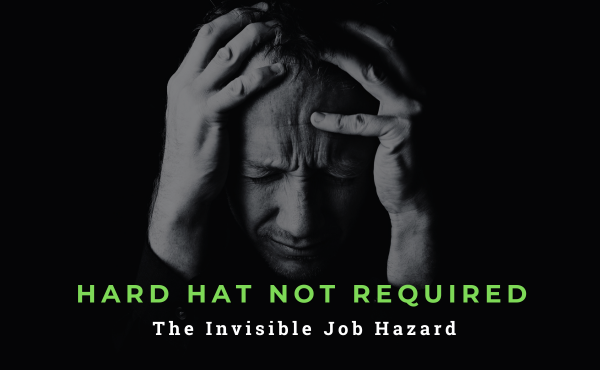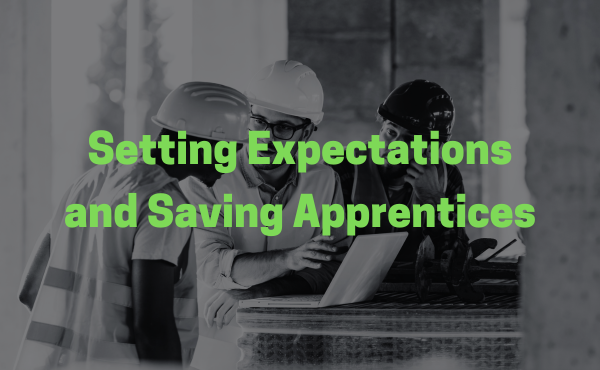The Greatest Lesson You Can Teach Your Apprentice

Picture this scenario:
John is a construction apprentice who’s been given a new task he’s never faced before. It’s a big challenge for him and he doesn’t really know how to get it done.
Now let’s take a look inside John’s head. We might find him thinking one of two ways: Using a fixed mindset or a growth mindset. People typically tend to use one or the other – and the difference has a lot to do with our success in training great apprentices.
People with a fixed mindset believe that their capabilities are set. In other words, everyone has their strengths and weaknesses and there’s no real way to change that. Bad at math? Nothing’s going to make you not be bad at math for the rest of your life.
People with a growth mindset believe they can level up. They think if they can practice and get help, they’ll get better at math even if they’ve struggled before.
Enough with the definitions. Let’s go back to what’s going on in John’s head and look at the impact of the fixed and growth mindsets.
If John has a fixed mindset, he’s going to get frustrated with his new task as he struggles with it. His confidence drops. “Maybe I’m just not cut out for this,” is something that’s going to go through his head. Maybe, if that thought occurs to him often enough over the weeks and months, he loses heart and quits. If he doesn’t quit, he’ll probably always want to work on the tasks he thinks he can do well and do his best to avoid those where he’s not confident.
If John has a growth mindset, he’s going to look at this new task as a challenge and be eager to take it on. He recognizes that he’ll make mistakes but knows that he’ll learn from them and grow his overall skill set. He’ll see it as a chance to get better and seek help from more experienced people around him. He’ll be resilient to the difficulties he encounters along the way.
Anyone choosing between the two is going to want “growth mindset” John. And here’s the key: Mindset isn’t fixed. Apprenticeship programs can help their apprentices adopt a growth mindset with all the benefits that it brings.
Here are some simple approaches you can use to create a growth mindset in your program:
Learning from Expert Mentors
We’ve talked about the value of mentorship before. Mentors aren’t just another kind of instructor, but someone who can provide support and share their own experiences with setbacks and how to adapt to them. They can talk about challenges they’ve faced and the solutions they learned, helping apprentices quickly learn valuable lessons secondhand.
Sharing Real-Life Stories from the Program
Your program has no shortage of apprentices who started off slowly but worked hard and became great construction professionals. Have them tell those stories or have your instructors do it. Highlight how determination and guidance helped them get to where they are. The message of the growth mindset is that anyone can succeed if they’re willing to try hard, make mistakes, and learn – and the living examples are all around your apprentices today.
Turning Mistakes into Insights
Share stories of overcoming early mistakes. For example, Sir James Dyson had an idea for a vacuum cleaner and built 5,127 prototypes before getting it right. Encourage apprentices not to dwell on the “messing it up” aspect of their mistakes, but to identify lessons to be learned and strategies for improvement. This builds resilience and a habit of learning from experience.
Setting Goals and Tracking Progress
Encourage your apprentices to set long-term goals and break them down into shorter-term goals and steps. Track their progress with them and celebrate their achievements. This helps apprentices make the connection between effort, growth, and success in their own careers.
Embracing Challenges and Feedback
Finally, encourage your apprentices to take on different challenges and expand their range of skills and experiences. Have them seek constructive feedback from mentors and colleagues along the way. Building a habit of taking on new challenges and learning from feedback now will ensure that they continue to grow and develop as they mature into construction professionals.
Mindset is a powerful force that apprenticeship programs can harness for tremendous benefit. Want a can-do attitude and a culture of persistence? Build a growth mindset in your apprentices and watch it happen.







Accurate Screening of Apprentices in Four Steps
A Realistic Job Preview
Start with a brief online video that explains a career in union construction. The video is helping people have the right understanding of :
- What it means to have a career in construction
- What to expect – an honest look at the good and the bad
- What the union expects of t
- What to expect – an honest look at the good and the bad
- What the union expects of them
Candidates Completes APS Success Profile
A 60-min online based test. The assessment evaluates candidates’ aptitude, personality, and cognitive capabilities related to a career in construction.
Your Program Receives Assessment Results Online
Assessment results are returned with easy-to-use “traffic light” indicators (green, yellow, and red) to group applicants by assessment score and mechanical reasoning capability.
Interviews are Held with Behavior Based Questions
Interview is based on a technique that research has shown to be 4x more effective at predicting success than traditional interviews.




